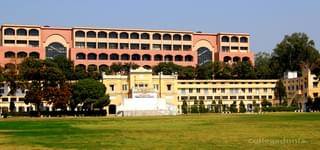BSc Agriculture Subjects in 2nd year are Crop Production Technology, Production Technology for Vegetables and Spices, Fruit and plantation Crops, Farming System & Sustainable Agriculture, Livestock and Poultry Management etc.
See Also:
BSc Agriculture subjects in the second year focus on the production technology of various products. It also focuses on Renewable Energy and Green Technology. Students also learn about live stock and poultry production that helps farmers to grow both plants and animals.
Table of Contents
BSc Agriculture Course Details
Some of the major details of BSc Agriculture are tabulated below for your reference,
| Degree | Undergraduate |
| Full form | Bachelor of Science in Agriculture |
| Duration | 4 years |
| Age | Candidate must be minimum 17 years |
| Minimum Eligibility | Candidates must have completed an undergraduate degree in Science with a minimum of 50% or above from a recognized institute |
| Average Fees | INR 10,000 - 5,00,000 for the entire duration |
| Average Salary | INR 2.50 L - 4.40 LPA |
| Employment Roles | Research Scientists, Quality Control Chemist, Quality Assurance Manager, Clinical research Associate, Data Analyst, Food Technologist, Marketing Executive |
| Employment Sectors | Pharmaceutical Industry, Chemical Firms, Actuaries, Research Centers, Public Relation, Academic Institutions |
| Top Recruiters | Cargill, Bayer, Syngenta, John Deere, CNH Industrial Dupont |
BSc Agriculture 2nd Year Syllabus
BSc Agriculture second year comprises more theoretical subjects than practical subjects. These subjects relate to crop production, plant breeding, renewable energy, seed technology, farm machinery and power, statistics, livestock and poultry management etc. The syllabus of BSc Agriculture is tabulated below for your reference,
| Semester III | Semester IV |
|---|---|
| Crop Production Technology-I (Kharif Crops) | Crop Production Technology- II (Rabi Crops) |
| Production Technology for Vegetables and Spices | Production Technology for Fruit and plantation Crops |
| Fundamentals of Plant Breeding | Farming System & Sustainable Agriculture |
| Livestock and Poultry Management | Renewable Energy and Green Technology |
| Agricultural Finance and Cooperation | Problematic Soils and Their Management |
| Agri-Informatics | Introductory Agro-meteorology & Climate change |
| Environmental Studies and Disaster Management | Agricultural Marketing Trade & Prices |
| Statistical Methods | Introductory Agro-meteorology & Climate change |
| Livestock and Poultry Management | - |
BSc Agriculture 2nd Year Subjects
BSc Agriculture second year course comprises core subjects as well as elective subjects. Some of the important topics covered are crop production technology, plant breeding, agricultural finance and cooperation, agri-informatics, farm machinery and power, statistical methods etc. Let’s discuss these above subjects in detail,
See Also:
BSc Agriculture Third Semester Subjects
- Crop Production Technology-I (Kharif Crops) - This includes knowledge about Origin, geographical distribution, economic importance, soil and climate with their requirements, varieties, cultural practices, Cereals such as rice, maize, sorghum, groundnut,and soybean; fiber crops- cotton & Jute etc.
- Fundamental of Plant Breeding - This includes Genetics in relation to plant breeding, modes of reproduction and apomixis, self-incompatibility and male sterility- genetic consequences, cultivar options. Domestication, Acclimatization etc.
- Agricultural Finance and Cooperation - This includes Agricultural Finance, credit needs and its role in Indian agriculture. Agricultural credit:. Credit analysis: 4 R’s, and 3 C's of credits etc.
- Agri-Informatics - This includes an introduction to Computers, Operating Systems, definitions and types, MS Office for document creation & Editing, Data presentation, interpretation and graph creation, statistical analysis, mathematical expressions, etc.
- Production Technology for Vegetables and Spices - This includes Importance of vegetables & spices in human nutrition and national economy, kitchen gardening, improved varieties and cultivation practices such as time of sowing, sowing, transplanting techniques, planting distance, fertilizer requirements etc.
- Environmental Studies and Disaster Management - This includes the Multidisciplinary nature of environmental studies Definition, scope and importance. Natural Resources: Renewable and non-renewable resources, Natural resources and associated problems etc.
- Statistical Methods - This includes the basics of Statistics and its Applications in Agriculture also includes Graphical Representation, Measures of Central Tendency & Dispersion, Definition of Probability, Addition and Multiplication Theorem etc.
- Livestock and Poultry Management - This includes the role of livestock in the national economy. Reproduction in farm animals and poultry, space required for livestock and poultry, Management of calves, etc.
See Also:
BSc Agriculture Fourth Semester Subjects
- Crop Production Technology- II (Rabi Crops)- This includes geographical distribution, the economic importance of soil and climatic requirements, cultural practices and yield of Rabi crops, cereals, etc.
- Production Technology for Ornamental Crops, MAP and Landscaping- This includes Importance and scope of ornamental crops, medicinal and aromatic plants and landscaping. Principles of landscaping.etc.
- Renewable Energy and Green Technology- This includes classification of energy sources, contribution in the agricultural sector, familiarization with biomass utilization, biofuel production and their application, familiarization with types of biogas plants and gasifiers, biogas, bioalcohol, biodiesel and bio oil production and their utilization as bioenergy resource, etc.
- Problematic Soils and Their Management- This includes reclamation and management of Saline and sodic soils, Acid soils, Acid Sulphate soils, Eroded and Compacted soils, Flooded soils, Polluted soils. Etc.
- Production Technology for Fruit and plantation Crops- This includes scope of fruit and plantation crop industry in India, Importance of rootstocks, Production technologies for the cultivation of major fruits-mango, banana, citrus, grape, guava, litchi, papaya, sapota, apple, pear, peach, walnut, almond and; minor fruits- date, pineapple, pomegranate etc.
- Principles of Seed Technology - This includes Seed and seed technology: introduction, definition and importance, deterioration causes of crop varieties and their control, Maintenance of genetic purity during seed production, seed 14 quality, Definition, Characters of good quality seed, different classes of seed etc.
- Farming System & Sustainable Agriculture- This includes farming system, its scope, Types and systems of farming system and factors affecting types of farming, Farming system components and their maintenance, Cropping system and pattern, multiple cropping system, etc.
- Agricultural Marketing Trade & Prices- This includes Agricultural Marketing: Concepts and definitions of market, marketing, agricultural marketing, market structure, marketing mix and market segmentation, classification and characteristics of agricultural markets; demand, supply and producer’s surplus of agri commodities etc.
See Also:
Top BSc Agriculture Colleges in India
India is home to more than 600 colleges offering BSc Agriculture programs whereas only 20% of the colleges are government colleges, rest of the colleges are deemed or private colleges. Some of the top colleges are tabulated below for your reference,
BSc Agriculture 2nd Year Syllabus: FAQs
Ques. What are the subjects of BSc Agriculture Second Year?
Ans. Some of the subjects included in BSc Agriculture second year Crop Production Technology-I (Kharif Crops), Fundamentals of Plant Breeding, Production Technology for Ornamental Crops, MAP and Landscaping etc.
Ques. What is the syllabus of BSc Agriculture ?
Ans. The syllabus of MCA includes Crop Production Technology-I (Kharif Crops), Fundamentals of Plant Breeding, Production Technology for Ornamental Crops, MAP and Landscaping , intellectual property rights, Environmental studies and disaster management etc.
Ques. What are the total marks of BSc Agriculture ?
Ans. The BSc Agriculture entrance marks are of 2 hours which is a total of 200 marks .
Ques. How many semesters are there in BSc Agriculture ?
Ans. There are a total of 8 semesters in BSc Agriculture.
Ques. Is BSc Agriculture useful or not?
Ans. Yes, BSc Agriculture offers a wide range of opportunities in both private as well as public sector.
Ques. Does BSc have biology as a subject?
Ans.. Yes, BSc Agriculture does require Biology as a subject.
Ques. Do I need a minimum aggregate marks for getting admission in BSc Agriculture ?
Ans. Yes, a candidate must have scored a minimum of 50% or above to get admission in BSc Agriculture.
Ques. What is the minimum age of BSc Agriculture ?
Ans. The candidate must be a minimum of 18 years of age.
Ques. Is BSc Agriculture good for girls?
Ans. Yes, BSc Agriculture can be a very good study option for candidates.
Ques. What are the average fees of BSc Agriculture ?
Ans. The average fees of BSc Agriculture is INR 6000 - 1.50 LPA.


![Siksha 'O' Anusandhan University - [SOA]](https://image-static.collegedunia.com/public/college_data/images/appImage/1737985425Screenshot20250127191243.png?h=150&w=320&mode=stretch)
![Roorkee Institute of Technology - [RIT]](https://image-static.collegedunia.com/public/college_data/images/appImage/1707201237CDCoverPage11.jpg?h=150&w=320&mode=stretch)



![Mangalayatan University - [MU]](https://image-static.collegedunia.com/public/college_data/images/appImage/1587063265bld.png?h=150&w=320&mode=stretch)

![Maharaja Agrasen Himalayan Garhwal University - [MAHGU]](https://image-static.collegedunia.com/public/college_data/images/appImage/1583990018g1.jpeg?h=150&w=320&mode=stretch)

Comments